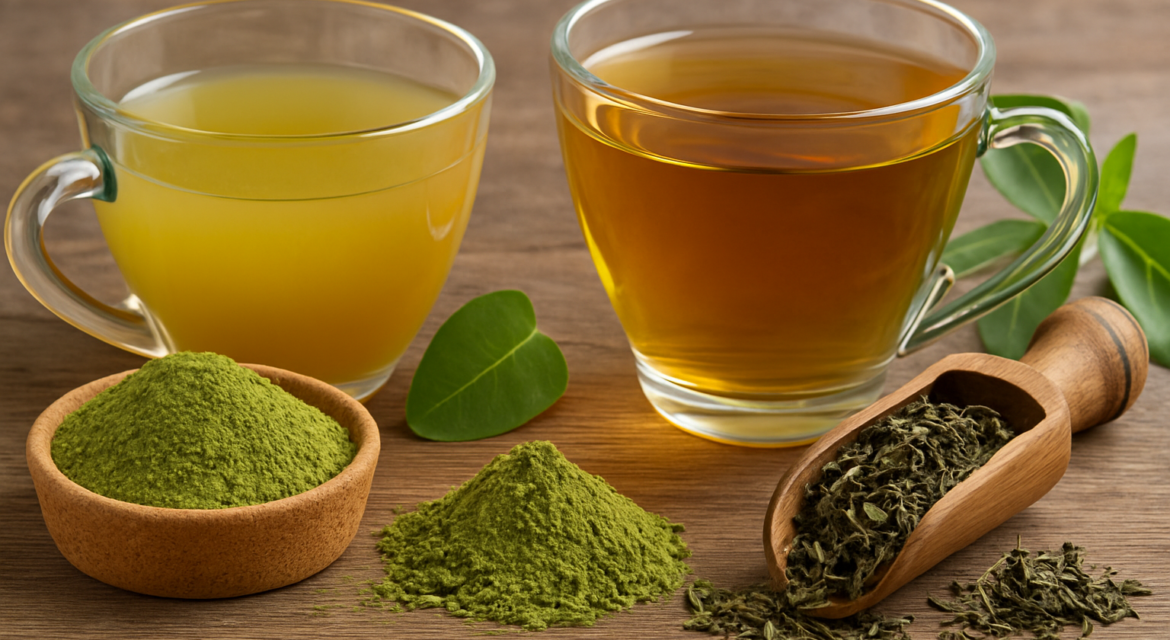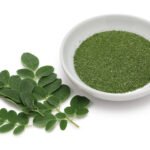 19 May 2025
19 May 2025Moringa Tea vs. Green Tea: Which One is Better?
Tea is not just a beverage; it’s a ritual, a comfort, and for many, an essential part of a healthy lifestyle. Two types of teas have gained significant popularity among health enthusiasts in recent years: Moringa tea and Green tea. Both are loaded with powerful antioxidants and nutrients, but they come from very different plants and offer unique benefits. So, when it comes to choosing between Moringa tea and Green tea, which one truly stands out? Let’s dive deep and find out.
Understanding the Basics
Moringa tea is made from the dried leaves of the Moringa oleifera tree, often referred to as the “Miracle Tree” due to its exceptional nutritional profile. It’s caffeine-free and rich in vitamins, minerals, and antioxidants.
Green tea, on the other hand, comes from the Camellia sinensis plant. It is minimally processed to preserve its high concentration of catechins — natural antioxidants linked to numerous health benefits. Unlike Moringa, Green tea naturally contains caffeine, offering a gentle energy boost.
Nutritional Profile Comparison
Both teas boast impressive nutritional benefits, but in slightly different ways.
- Moringa Tea: Extremely rich in vitamin C, calcium, potassium, iron, and essential amino acids. It also contains powerful antioxidants like quercetin and chlorogenic acid.
- Green Tea: Packed with catechins, especially epigallocatechin gallate (EGCG), known for its strong anti-inflammatory and metabolism-boosting properties. It also provides a good amount of vitamin C and other micronutrients.
In terms of sheer nutrient density, Moringa tea often takes the lead, especially for minerals and vitamins.
Antioxidant Power: Who Wins?
Both teas are excellent sources of antioxidants, but their antioxidant compounds are different.
Green tea is renowned for its high catechin content, particularly EGCG, which has been extensively studied for its ability to fight inflammation, promote heart health, and support weight management.
Moringa tea, meanwhile, is rich in flavonoids, polyphenols, and ascorbic acid (vitamin C), which help combat oxidative stress and protect against chronic diseases. Studies have shown that the antioxidant power of Moringa can sometimes even surpass that of Green tea, making it an underrated powerhouse.
Energy and Stimulation
One of the noticeable differences between the two is caffeine content.
- Green tea contains moderate levels of caffeine, typically around 20–45 mg per cup. It provides a mild energy lift without the jitters associated with coffee.
- Moringa tea is naturally caffeine-free, making it ideal for people who are sensitive to caffeine or looking for a calming beverage to enjoy any time of the day, even before bed.
If you want an energy boost, Green tea might be your go-to. If you prefer something more relaxing and gentle, Moringa tea is perfect.
Weight Management and Metabolism
Both teas are often associated with weight loss benefits, but they work differently.
Green tea’s catechins are known to slightly increase metabolism and promote fat oxidation, especially when combined with exercise. It’s often a staple in many weight-loss supplements.
Moringa tea supports weight management more subtly. It helps balance blood sugar levels and provides essential nutrients that can prevent cravings and overeating. Though it doesn’t stimulate metabolism like Green tea, its role in holistic health can contribute to a balanced weight over time.
Taste and Versatility
Taste can be a big deciding factor for many people.
- Green tea has a light, grassy, and slightly astringent flavor. If brewed improperly, it can become bitter.
- Moringa tea has a mild, earthy taste with slightly nutty undertones. It tends to be more forgiving during brewing and blends beautifully with herbs like mint or lemon.
In terms of versatility, Moringa tea can be enjoyed both hot and cold, and it pairs well with other natural flavors without overpowering them.
Health Benefits at a Glance
Here’s a quick comparison of the major health benefits:
- Moringa Tea:
- Supports immune system
- Reduces inflammation
- Balances blood sugar
- Boosts iron and calcium intake
- Great for skin health
- Green Tea:
- Enhances metabolism
- Supports heart health
- Provides a gentle energy boost
- Rich in cancer-fighting antioxidants
- Improves brain function
Conclusion: Which One is Better?
The answer really depends on your personal needs.
If you’re looking for an energy-boosting, metabolism-enhancing drink and you enjoy a bit of caffeine, Green tea might be your best choice. It’s ideal for morning routines and pre-workout boosts.
On the other hand, if you want a nutrient-dense, caffeine-free beverage that supports overall wellness, strengthens the immune system, and can be enjoyed any time of day, Moringa tea is a fantastic option.
In reality, both teas are amazing additions to a healthy lifestyle. You don’t necessarily have to choose one over the other — you can alternate between them depending on what your body needs. Whether you’re sipping on the calming earthiness of Moringa or the refreshing lift of Green tea, you’re making a choice that nourishes both body and mind.





